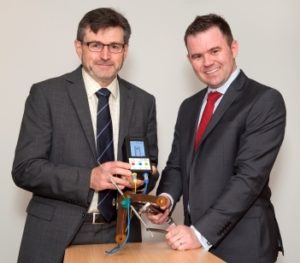
A South Australian orthopaedic device which removes the need for multiple x-rays when fixing bone fractures has received international acclaim from orthopaedic surgeons throughout the world.
The Ezy-Aim Electronic Digital Targeting System – developed by Adelaide-based orthopaedics company Austofix, with assistance from Flinders University’s Medical Device Partnering Program (MDPP) – provides surgeons with an effective device to assist them during the insertion of nails and screws when fixing bone fractures.
The device acts as a pair of eyes, allowing the surgeon to accurately judge the location of the implant inside the bone.
The system, which went to market last month, was completed after Austofix approached the MDPP to evaluate one of its proof of concept prototypes.
Austofix received State Government funding in 2011 through the Medical Device Commercialisation Program to further develop the prototype. The MDPP supported Austofix to develop the new targeting device, which has improved the surgical fixation technique for orthopaedic surgeons in Australia and world-wide.
Manufacturing and Innovation Minister Kyam Maher says this is a great outcome for Austofix and the state.
“South Australia continues to demonstrate fantastic capabilities in the development and commercialisation of innovative medical devices and Austofix is another great example,” he says.
“The medical device sector – worth around $12 billion annually in Australia – is a key focus for the State Government in helping build a sustainable, high-value manufacturing sector that links research and development with modern production practices.
“The device was showcased during the recent trade delegation to China’s Shandong Province, led by Premier Jay Weatherill.”
Austofix General Manager, Chris Henry, says the initial prototype developed with MDPP exceeded design specifications.
“The MDPP’s professional expertise in coordinating and facilitating the development of medical devices provided the impetus for this product to reach the commercialisation stage,” he says.
“Having established a strong working relationship during the initial MDPP project, Austofix returned to Flinders University for ongoing consultation and contract work. The MDPP and Flinders University have been integral in the design of the Ezy-Aim product, allowing us to enhance our product range of orthopaedic medical devices and implants and improve patient safety.
“We have received fantastic feedback from surgeons comparing our Ezy-Aim product with products from some of the largest surgical device companies in the world. The feedback included comments that our product was simpler and easier to use by comparison.”
The Ezy-Aim product complements the growing Austofix range of products and services of orthopaedic implants and cleanroom facilities.
The MDPP is currently administering the State Government’s Medical Technologies Program (MTP), established to support the development of new commercially viable medical and assistive devices.
Successful applicants can receive up to 250 hours of research expertise to assist with any stage of the research and development process.
For further information about the MDPP, please go to www.mdpp.org.au

